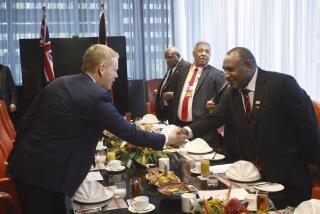Unable to Conclude Pact With U.S. : Pacific Islands of Palau Face Debt Crisis
- Share via
KOROR, Palau — The scattered Pacific islands of Palau sit like emerald mushrooms on an azure sea. From the air, the lazy turquoise lagoons and volcanic islands have a hypnotic tranquility. Under the sea, they are a diver’s paradise.
Over the last decade, however, the Western Pacific island chain has turned into a rallying point for anti-nuclear activists and an irritant to planners in the Pentagon.
Two presidents of Palau have died mysteriously in the last four years, and the government of a country of just 14,000 people is in danger of being crippled by debts.
“With our size of population,” says government spokesman Bonafacio Basilius, “placed almost anywhere else on Earth, no one would care. But because of our location, Palau is important.”
Most Palauans make a living from fishing and tourism or live off U.S. government handouts.
The United States considers Palau, a collection of about 200 islands 1,000 miles southeast of the Philippines, as strategically important.
Together with the island of Guam and the Marianas to the north they guard the routes between East Asia and the Pacific Ocean that were fiercely fought over in World War II.
Part of the U.S.-administered U.N. Trust Territory of Micronesia, which was created after the war, Palau in 1979 became the first country in the world to pass a constitution barring nuclear materials from its territory.
This put it directly at odds with the United States and turned it into a symbol for anti-nuclear campaigners throughout the Pacific.
President Ngiratkel Etpison, a 63-year-old businessman, was sworn in at the beginning of January and pledged to push for domestic self-rule while allowing the United States to continue to control Palau’s defense and foreign policies.
Palauans have voted six times in favor of a so-called Compact of Free Association with Washington since 1983, but each vote has fallen short of a 75% majority required by the constitution.
Other island states in Micronesia have either voted for commonwealth status within the United States or for free association, giving Washington continued control over a large strategic area of the western Pacific.
Basilius said Etpison was expected to seek a constitutional amendment lowering the size of the majority needed in a plebiscite to approve the compact.
While a small, vocal group of islanders is opposed to a clause in the pact which would allow transit of nuclear weapons through Palauan waters and airspace, landowners are opposed to a section which would grant the United States military use of a large area of the main island of Babeldaop.
Basilius says the United States has ruled out Palau as an alternative site for military bases if its major facilities in the Philippines were ever forced to move.
“We have had repeated talks with American defense planners,” he said in an interview in his office in the main government buildings, a converted U.S. satellite tracking station.
“They have told us they need Palau for military strategy, but only for denial. They don’t want anyone else to get it.”
But some foreign defense analysts say the United States could use Palau for jungle warfare training and possibly for harbor facilities.
To buy Palau’s guarantee that it will not become a steppingstone for any other country’s armies, the United States has sharply increased its offer of aid if the compact is approved.
It includes direct cash and aid of $460 million over 15 years, commitments to build roads, ports and harbors, which Basilius says would amount to another $200 million, and the creation of a $70-million trust fund expected to provide $20 million to $23 million annually.
But compensation for land to be appropriated for military use amounts to only $5.5 million, which Congressman Ignacio Anastacio described as “a pittance.”
As the pact founders in a constitutional limbo, the United States has turned the screws by restricting aid payments, making it difficult for the government, which has a budget of just $17 million, to pay its workers.
It has also been hit by a U.S. court ruling that Palau must pay more than $44 million in defaulted loans to an international consortium for an electric power station.
More to Read
Sign up for Essential California
The most important California stories and recommendations in your inbox every morning.
You may occasionally receive promotional content from the Los Angeles Times.













